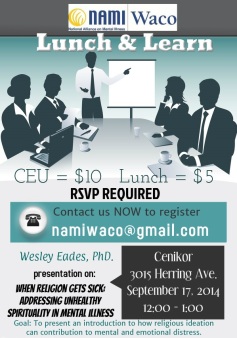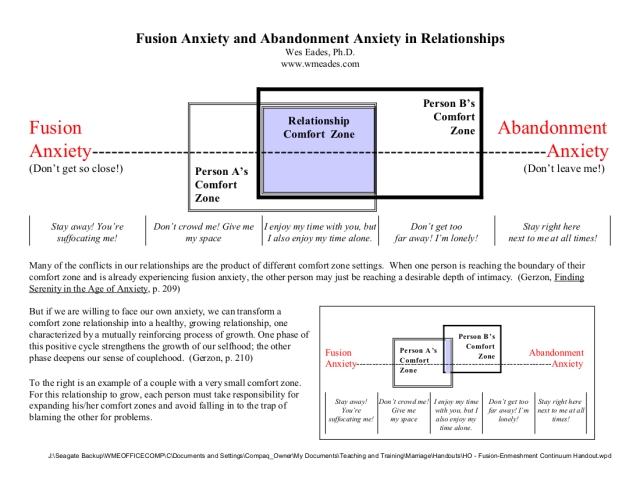Here’s the info for an upcoming workshop I’ll be presenting. (Please see the end of this post for a 1 hour, abbreviated version I’ll be offering for NAMI on September 17.)
When Religion Gets Sick: A Guide for Therapists 3 CEUs
- Date: Tuesday, September 30, 6:00 – 9:00 p.m. (soft drinks provided – participants are welcome to bring their dinner)
- Location: National Lloyds Building (corner of 9th and Austin), 4th floor
- 3 CEUs
- Sponsored by The Waco Partnership for Psychological and Spiritual Care
- Facilitator: Wes Eades, PhD
- Cost: $35, which includes a copy of Wes’s book Whirlwind: Journey’s with Job through Grief, Anxiety and Pain.
- To register and pay via PayPal, please click:

![]() Dr. Wes Eades has spent all of his career as a psychotherapist with a focused interest in the role of religion and spirituality in mental health. He has been particularly drawn to the destructive role religion can sometimes play in the suffering of persons.
Dr. Wes Eades has spent all of his career as a psychotherapist with a focused interest in the role of religion and spirituality in mental health. He has been particularly drawn to the destructive role religion can sometimes play in the suffering of persons.
Wes, and his friend, Dr. Milton Horne, have recently published Whirlwind: Journeys with Job through Grief, Anxiety, and Pain. Milton began his study of Job many years ago with his doctoral dissertation at Oxford, and has continued to wrestle with this enigmatic, and often confusing, story throughout his career as a professor of religion.
In Whirlwind Wes and Milt bring together a scholarly treatment of Job with the practice of psychotherapy to illustrate how religious beliefs can confound and compound suffering. Our central premise:
“We hold the assumption that real spiritual transformation occurs when people move from expecting God to take care of them, to realizing that peace is possible regardless of circumstances. Our observation is that people often use religion to try to control the uncontrollable, which, in turn, magnifies suffering.” ( from page ix of Whirlwind)
In this seminar Wes will discuss how this central premise plays out in his work with clients. Vignettes from Whirlwind will be used to foster discussion on the many ways that religious ideas can create fog in therapy, and to consider therapeutic approaches to working with the faith and spirituality of clients.
![]() To register and pay via PayPal, please click:
To register and pay via PayPal, please click: ![]()
I’ve also been invited by NAMI to provide a 1 hour “Lunch & Learn” on this topic on September 17 from 12:00 to 1:00. This presentation will be at the Cenikor office at 3015 Herring. The cost is $10 for 1 CEU plus $5 if you want lunch. The money goes to support the work of NAMI.
Pre-registration for Lunch and Learn is at this link





